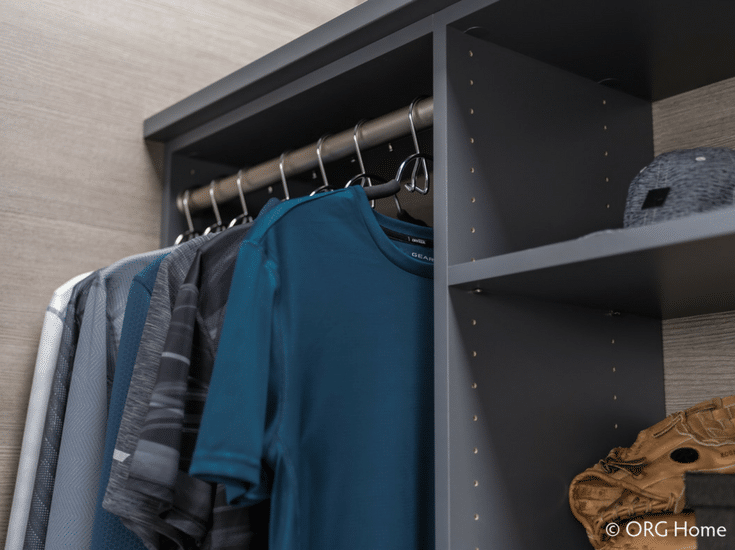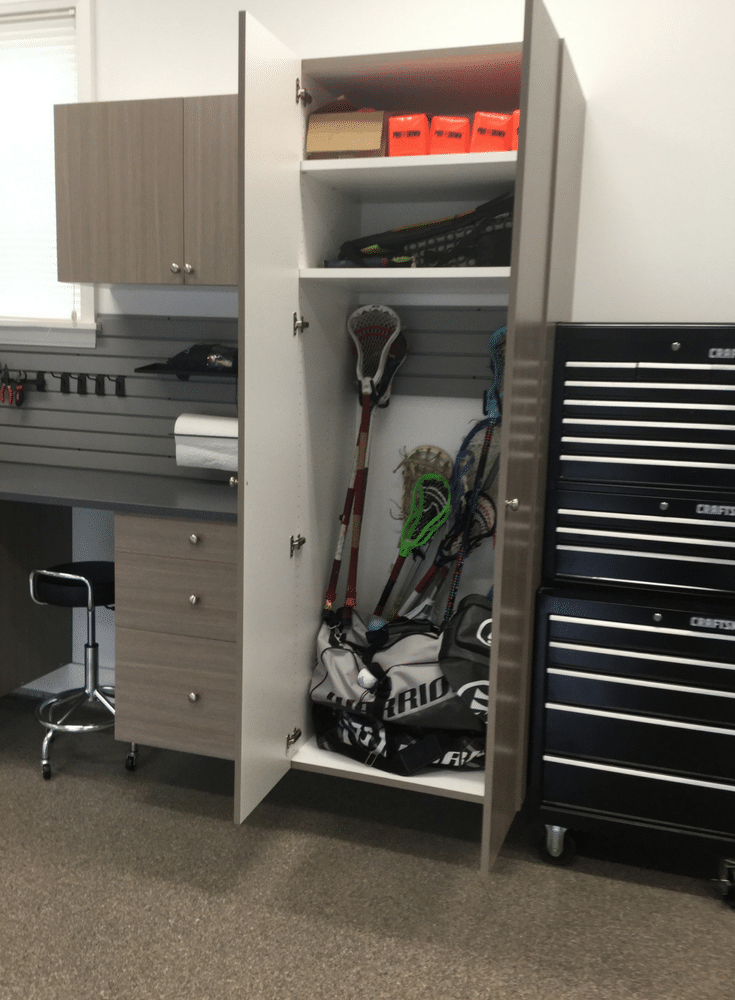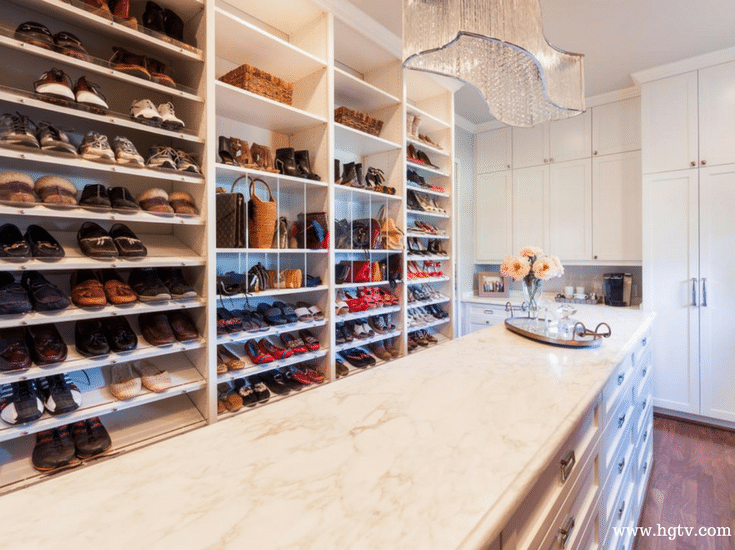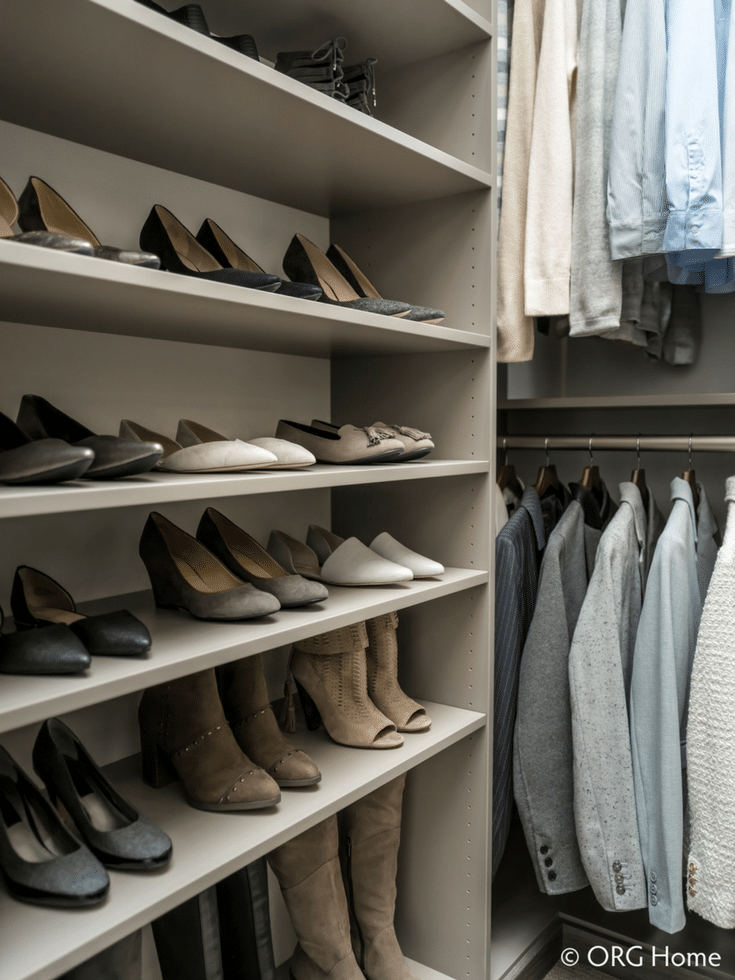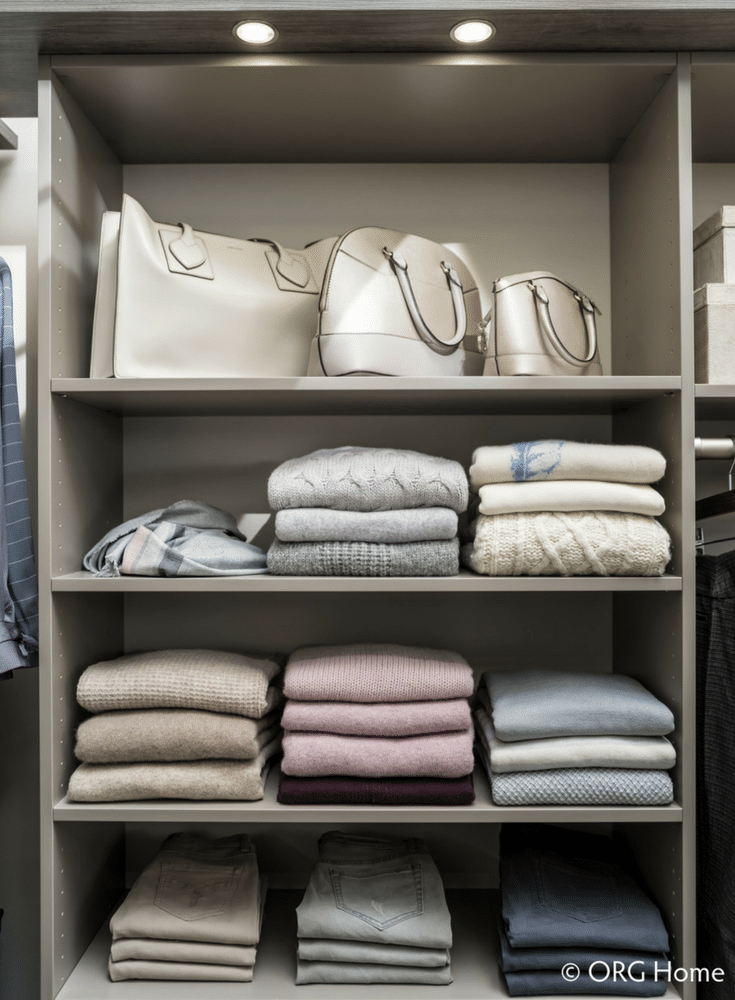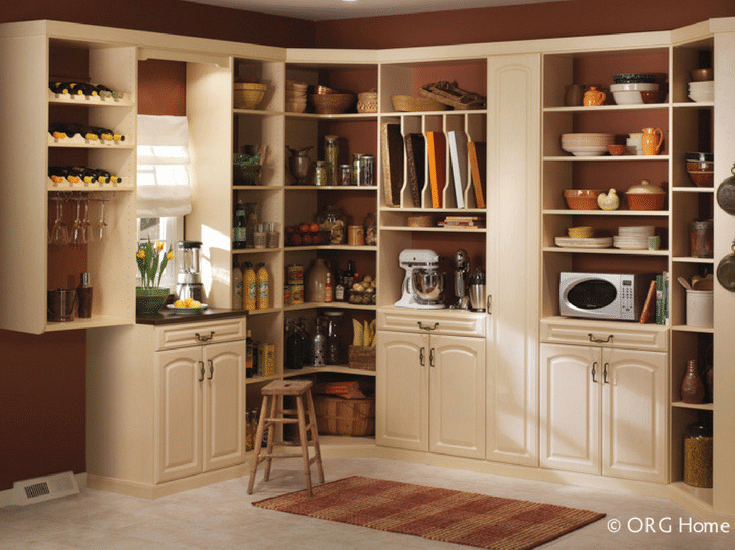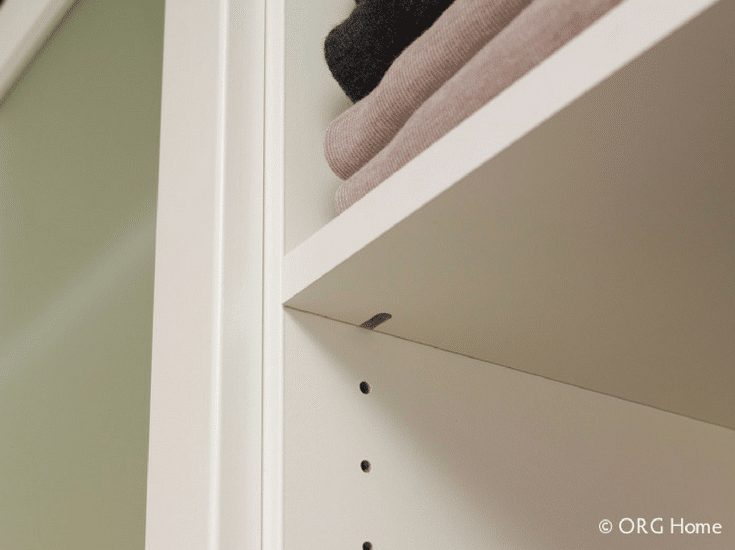7 Critical Factors to Choose the Best Shelving for Your Storage Project
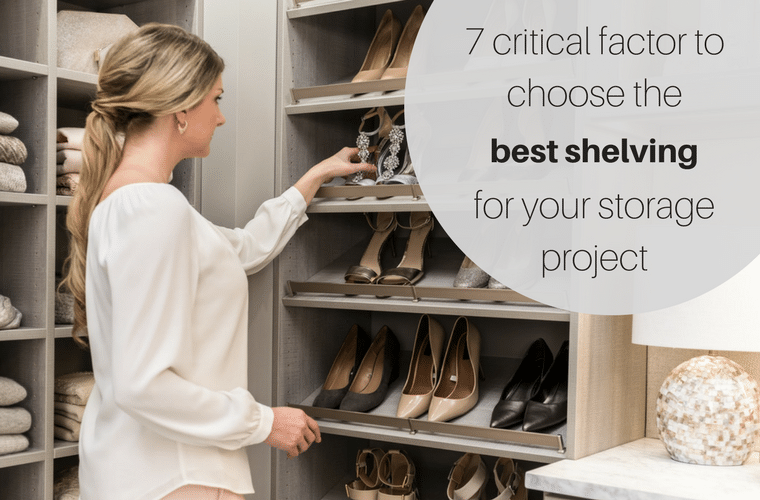
If you think a shelf is just a shelf think about how frustrating it is when these things happen:
- Your towels and sweaters are a pain to put away because they hang over the edge of your too-shallow 12” deep closet shelving.
- Last year your 3-year-old son yanked the shelf right out of the wall. Fortunately, he didn’t get hurt – this time.
- You throw your high heels in a jumbled mess on the floors because there are “holes” in the cheap wire shelving the builder slapped in.
- Since your pantry shelves are screwed into the wall, there are large dead spaces between shelves which you’d desperately like to use.
- Your garage shelving is bowed from too much weight. You fear the shelf is ready to blow any day. If the paint cans fall on your new car you may have a coronary.
Shelving is often the red-haired stepchild of a closet, pantry or garage storage system, but they shouldn’t be. Let’s face it – shelves dominate your pantry. In the garage they carry a heavy load of car and truck parts, paint cans and chain saws. In the closet they hold your jeans, sweatshirts, sweaters and even small luggage.
Properly designed shelves can elevate your shoes and give sweaters, jeans and sweatshirts a place where you can find and grab them quickly. They can be a secure place to hold heavy cans, appliances and tools IF you have the right shelves for the job.
The challenge is how do you choose the best shelving for your project? In this article we’ll look at 7 critical factors to make the best selection for any storage area of your home.
Factor #1 – Do your shelves adjust to your stuff?
The biggest problem BY FAR with shelving is they are often installed as immovable objects. Wire and wood shelves are screwed or anchored in – giving you no flexibility. As a result, you have dead space between the shelves you can’t do anything about. This is space you need for increased (and more efficient) storage. How can you fix this?
The best way is to use a system with adjustable side supports with shelves which rest on pins. These shelves can be easily moved up and down in 32 mm – or 1 ¼” increments. To increase closet efficiency, put shoes which hold your flats and tennis shoes closer together. Allow wider spaces for bulky sweaters, comforters, towels and blankets. With flexible shelving systems you control the space between shelves. The shelving systems doesn’t control you.
Factor #2 – Are your shelves designed to carry the load?
Thickness, length and the right material choice will determine if your shelves stand up or bend like Karl Wallenda on a high wire. Don’t try to use ½” thick shelves from old wood kitchen cabinets, reinstall them in the garage and expect them to hold heavy paint cans. You will be destined for failure. You could also end up with broken shelving and a “colorful” garage floor if they don’t hold the weight.
The key is to match the thickness and length of the shelves to the items they’re holding. In the garage with its heavy items, I’d recommend 1” laminate shelves or heavy-duty steel shelving.
In pantries – (which hold heavy canned goods and appliances) a ¾” laminate over a multi-density fiberboard will support far more weight than thin wire or wood shelves. The laminate shelves also won’t warp like wood.
Factor #3 – Do you want fashion or function out of your shelves?
Have you ever thought of shelving as something fashionable? If not – picture the glamorous display of Khloe Kardashian’s shoe closet on Pinterest. The lighting is perfect. The shoes are raised like fashion-forward Jimmy Choo’s at Nordstrom’s.
Or consider the sleek, minimalist floating shelves in a downtown Columbus loft conversion space. Raised and floating shelves are fashion personified.
On the other hand, flat shelves are the workhorse in a functional, space-efficient design. In a small bedroom closet, you may need to space the shelves close together to fit your 30-40 (and growing) pairs of shoes.
In a cramped pantry you’ll want to space your shelves close to store more cans and canning jars into a small area.
Shelves can be about fashion or function – which makes the most sense for your space?
Factor #4 – Shelving depth should not be a given, it should be your choice
Wire shelving you buy at the big-box store (or your builder throws in to save cost) is usually 12” deep. While this depth “saves” money on initial costs it won’t do a good job for you. Your towels, sweatshirts and bulky sweaters will hang off the edge. Your closet will look disorganized.
Why accept shelves which are too shallow because it’s more cost-effective for the manufacturer or cuts cost for the builder Get shelving which will make your closet neat and efficient. Upgrade from 12” to 14” deep shelving. Your things won’t be hanging over the edge. It’s not much more expensive than 12” – but works better. If you want a more glamourous floor based system 16”, 19” or 24” depths are all options.
Don’t accept shelving which doesn’t live well for you.
Factor #5 – Are you cornered into a bad design?
It can be a pain to store in the corners of a walk in pantry or closet. In the closet if you have clothes backing up to clothes, it’s near impossible to see what’s in the corner. Specially designed L shaped or angled corner shelves will solve this problem. They are design to “turn the corner” and provide more depth for folded sweaters, jeans in a closet – or for large appliances, boxes or cans in a pantry design.
Factor #6 – Are your shelves safe?
If you’re like most parents you probably haven’t thought about shelving as a safety concern, but with adjustable shelving systems (where the shelves aren’t inflexibly screwed into the wall) the shelves rest on pins. This makes it simple for your young son or daughter to pull a shelf – and its contents out – toppling onto them (OUCH!).
If you want adjustable shelving – without a worry about safety, the solution is ‘notched shelves.’ These shelves have notches (or indentations) in the bottom so they won’t come out when your little one pulls on them. They cost $2 more per shelf than a standard shelf which sits on top of pins. This small safety feature is worth it.
Factor #7 – Should your shelving be concealed or open?
In my house, if my wife Rose had her way, our shelving would all be hidden behind doors. It gives a neater appearance (even if there is clutter and disorganization lurking behind the doors). When you have open shelving (whether it’s in a closet, a pantry, or garage) you have a constant challenge keeping things orderly. There are 2 problems, however, with concealed shelving you need to know.
- A complete cabinet system with hidden shelves is more expensive because you have the added cost of the doors.
- When space is tight concealed shelves may not be practical because there isn’t enough depth to open doors.
In designing your next pantry, closet or garage – there is a third approach – beyond entirely open shelves or shelving completed concealed behind cabinet doors. This third option is to do a hybrid – a combination of both. Use concealed shelving and finished cabinetry doors in areas where you want (and have the room to) open doors and a finished look. Where you don’t have the room (for example behind doors which swing in) use less expensive open shelves.
Conclusion
Unfortunately, like life – selecting the right shelving involves more complexity than slapping up the first ½” thick x 12” deep wood board or thin wire contraption you can add to your cart from a big box store. Give more thought to your shelving selections. Make sure your system adjusts to your family’s needs. Figure out if the shelves are designed to carry the weight you have in mind. Are they safe and made in the best depth? Ask yourself if you care more about fashion or function.
How can I (or my team) help you?
If you need help designing a custom closet, walk in pantry or garage cabinetry system and choosing the right shelving we can make life simple for you with a Free 3D design. In Columbus call Innovate Home Org at 614-545-6888 or in Cleveland at 216-658-1290.
For more articles on storage solutions and design follow me or my companies on Twitter at @Mike_Foti, @InnovateBuild or @InnovateHomeOrg.
Tags: adjustable shelves, closet shelf organizer, closet shelving systems, closet storage, Columbus adjustable shelves, Columbus corner shelves, Columbus corner shelving, Columbus pantry closet, Columbus walk in pantry, corner shelves, corner shelving, garage shelving systems, pantry closet, pantry shelf ideas, pantry shelves, pantry shelving, shelves for a walk-in closet, shelves for closet, shelves for garage, shelving for closets, shelving for garage, shoe closet, shoe organizer, storage closet, walk in pantry.
